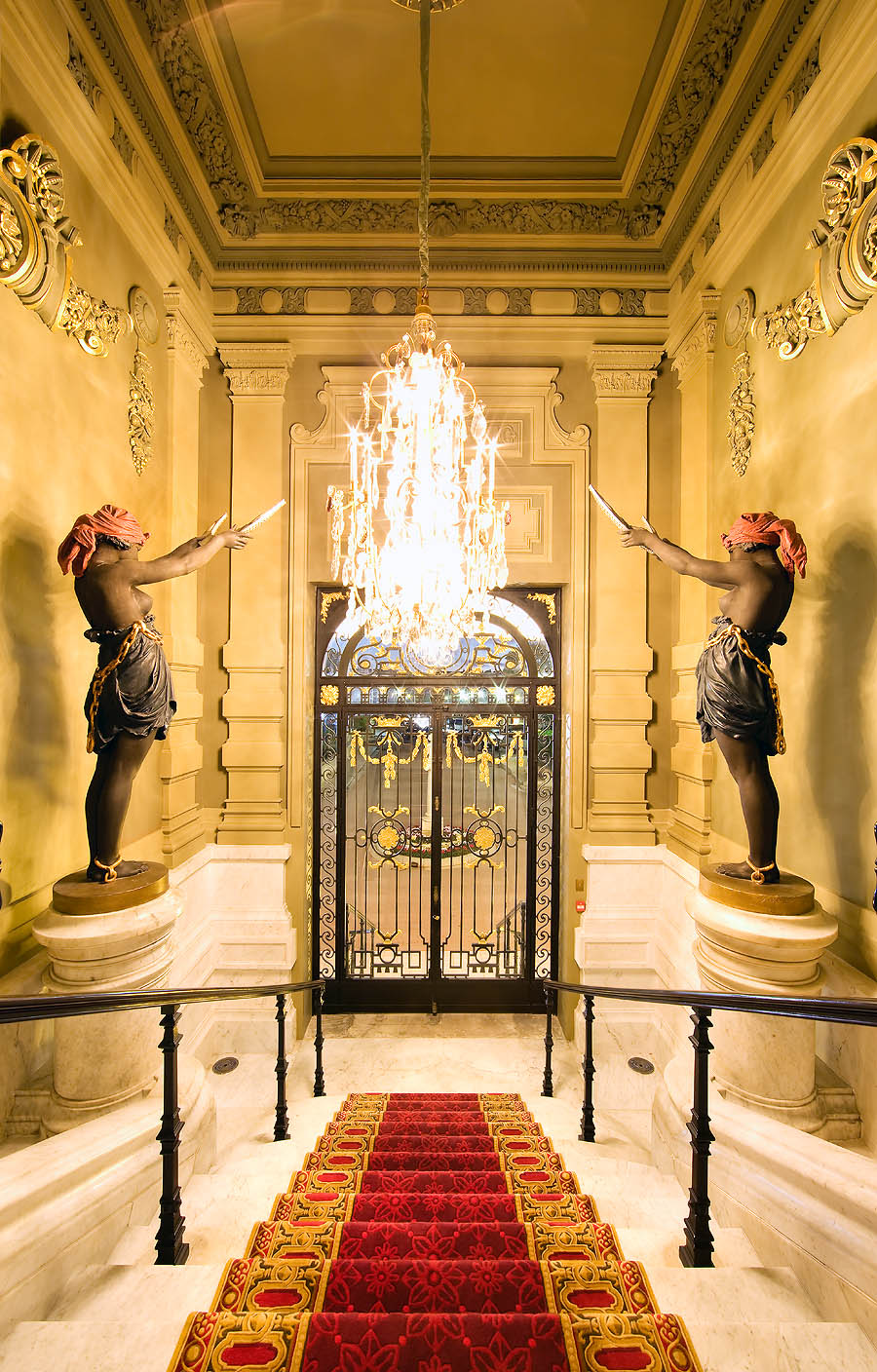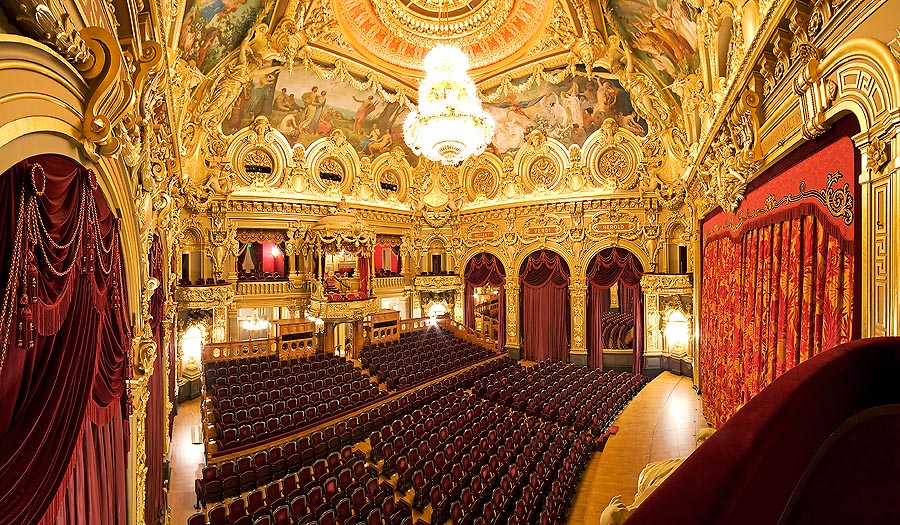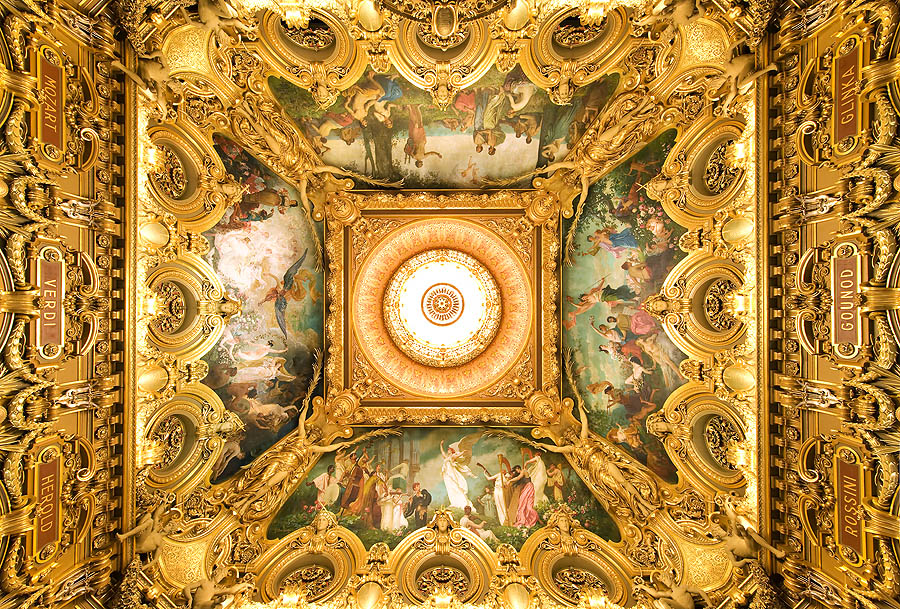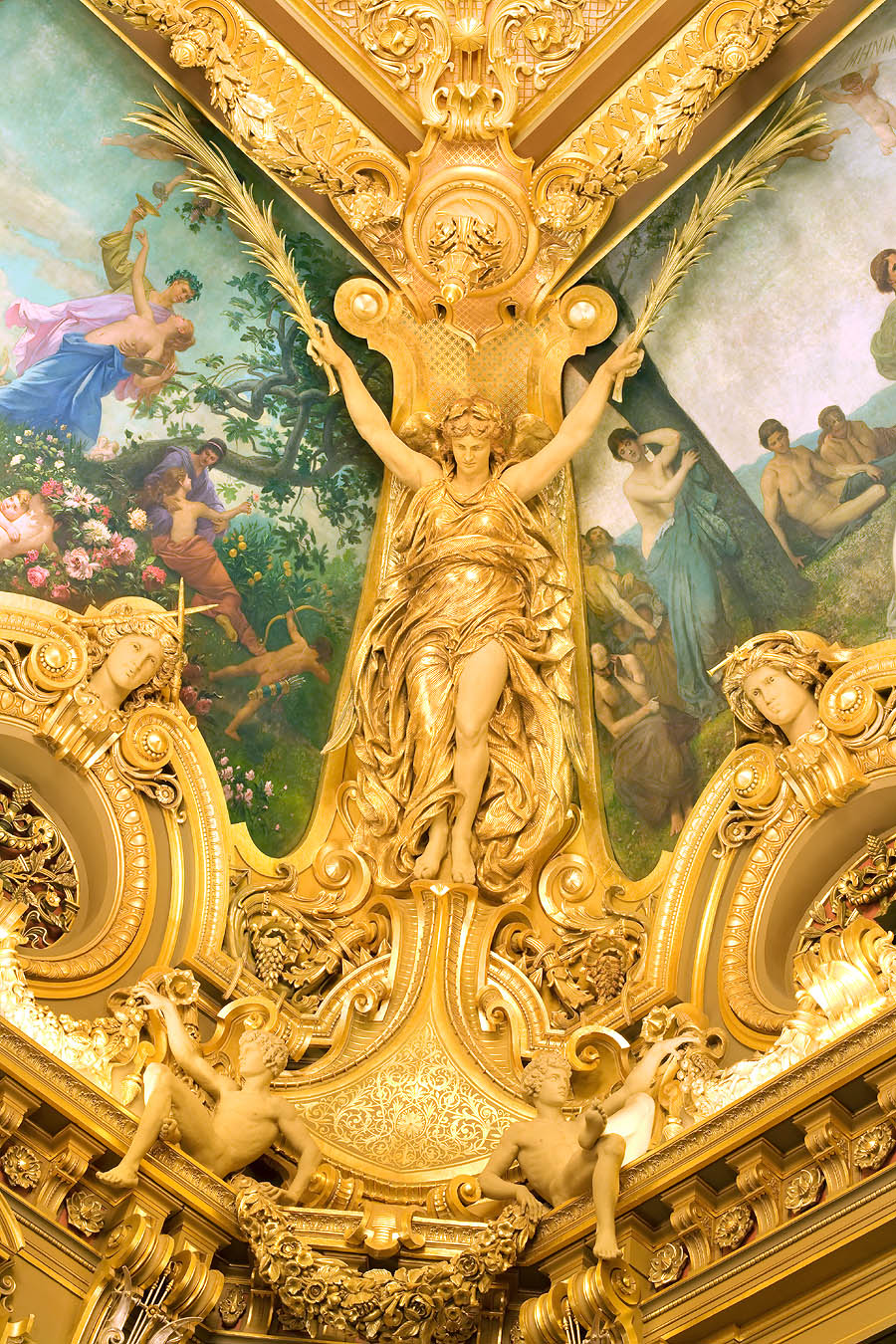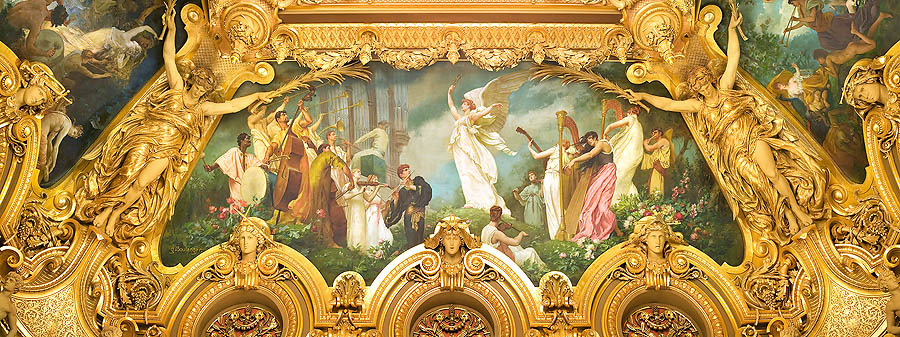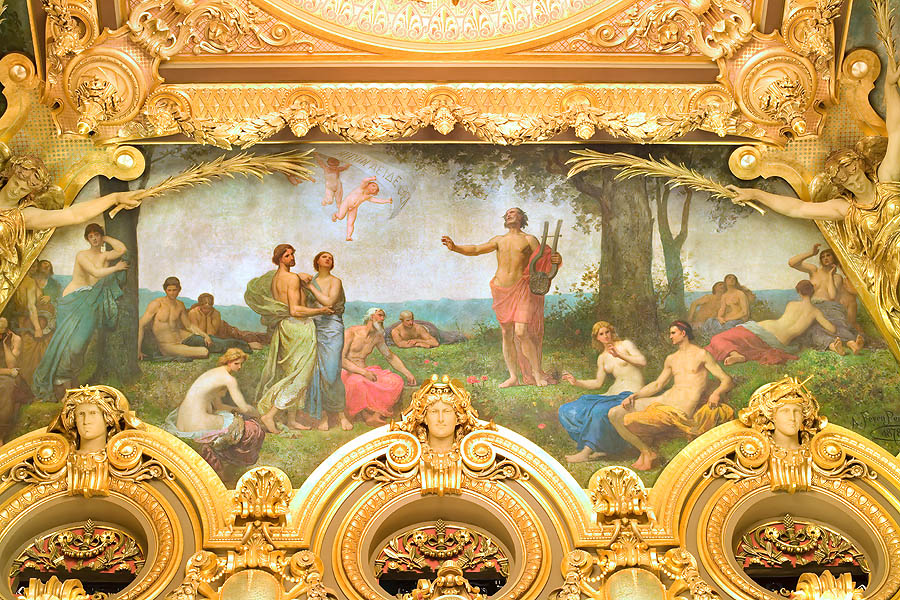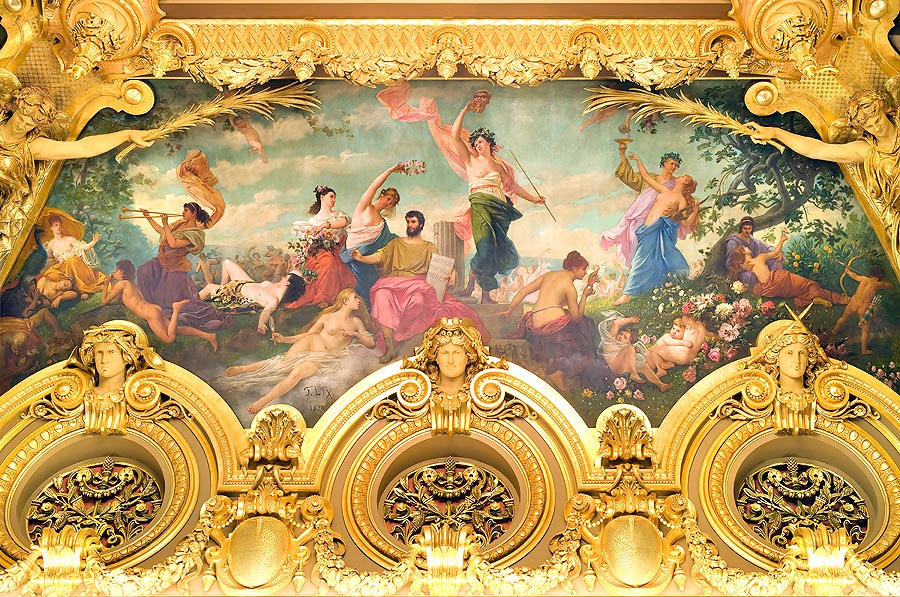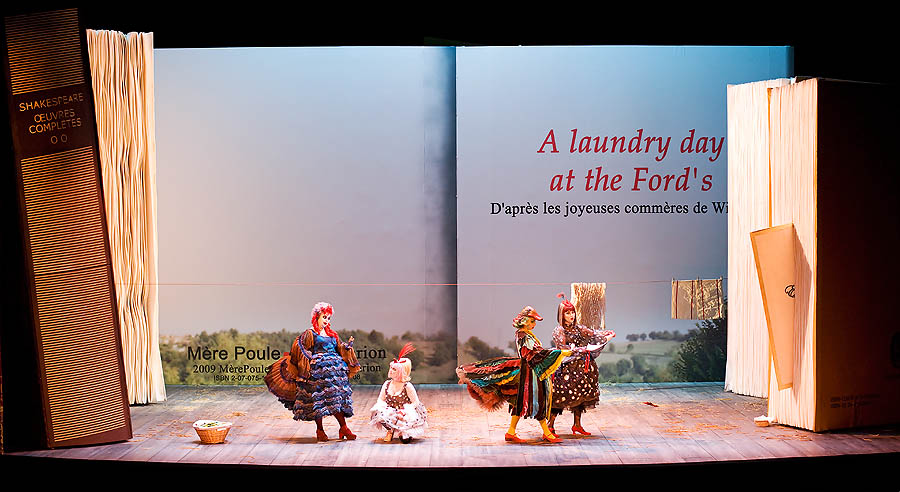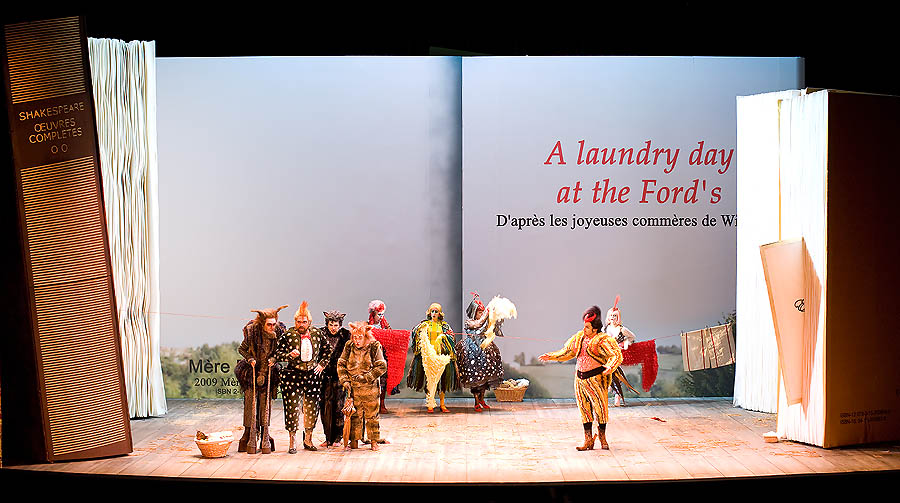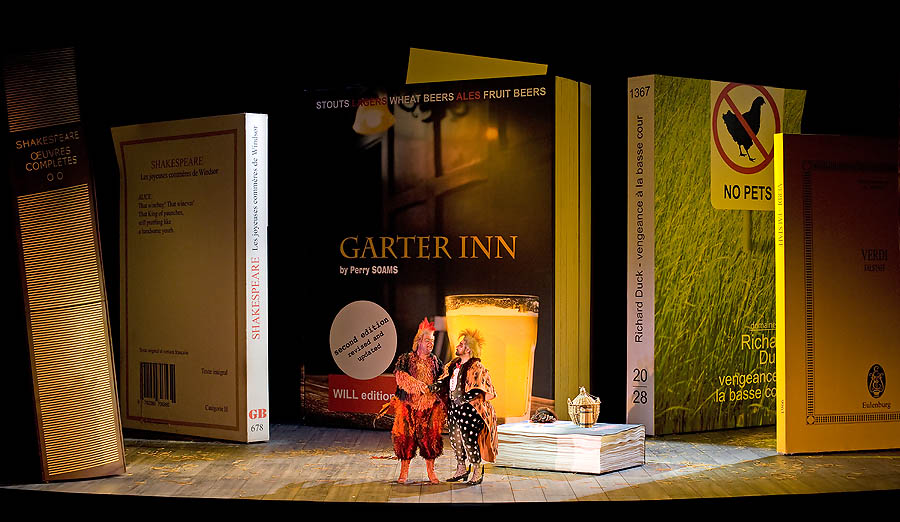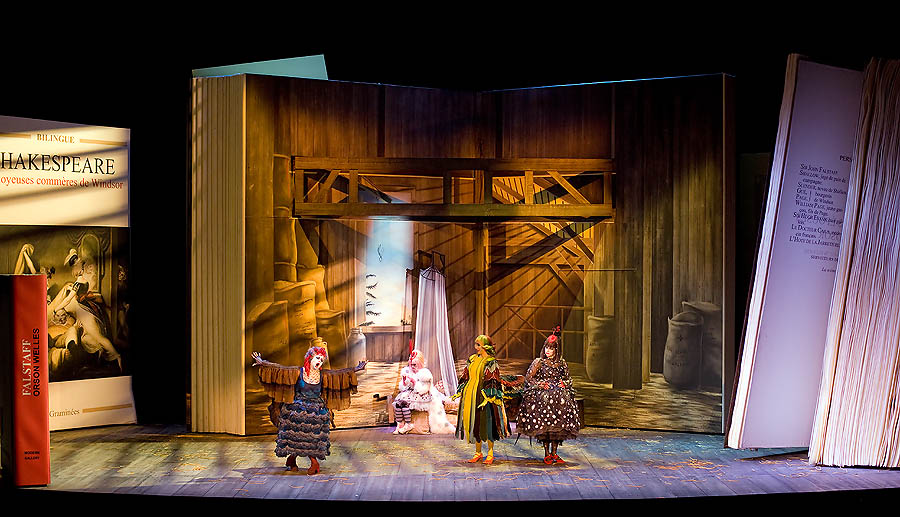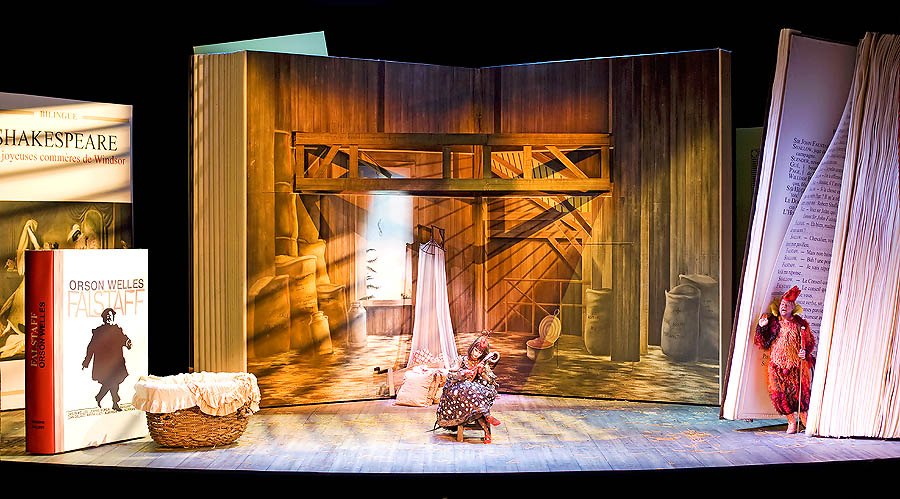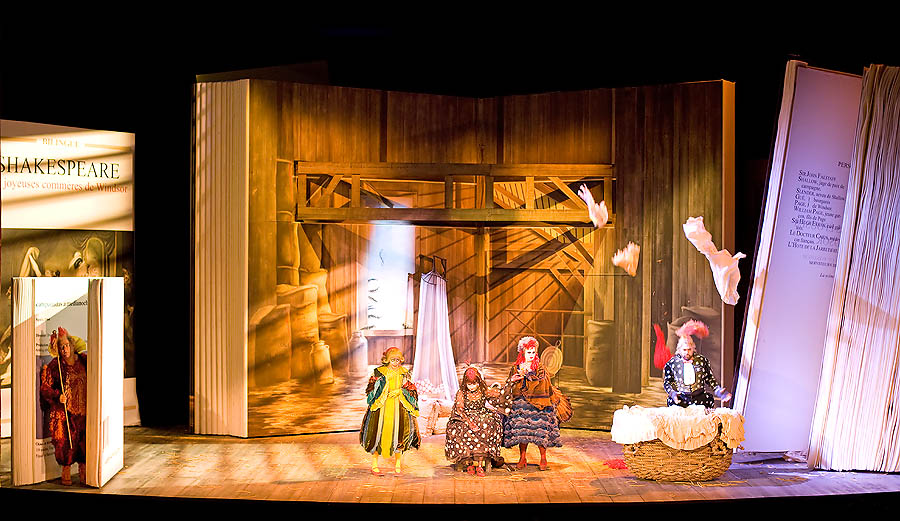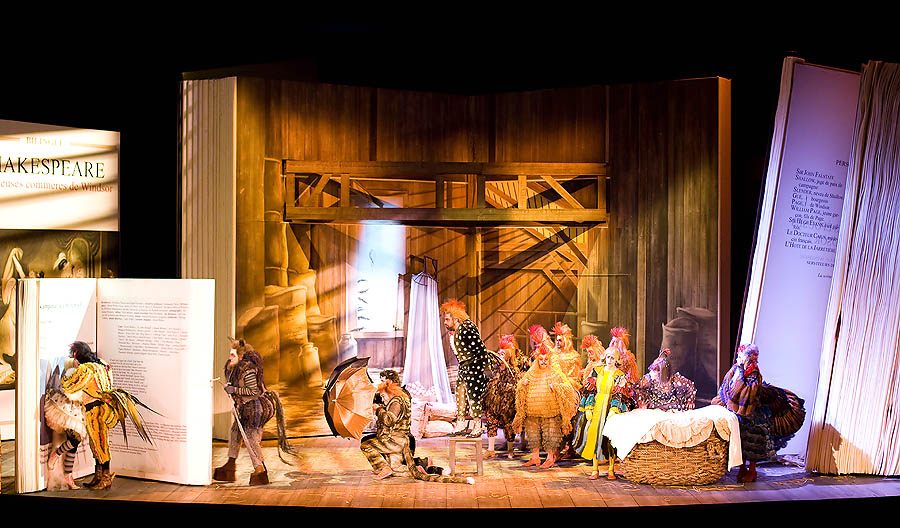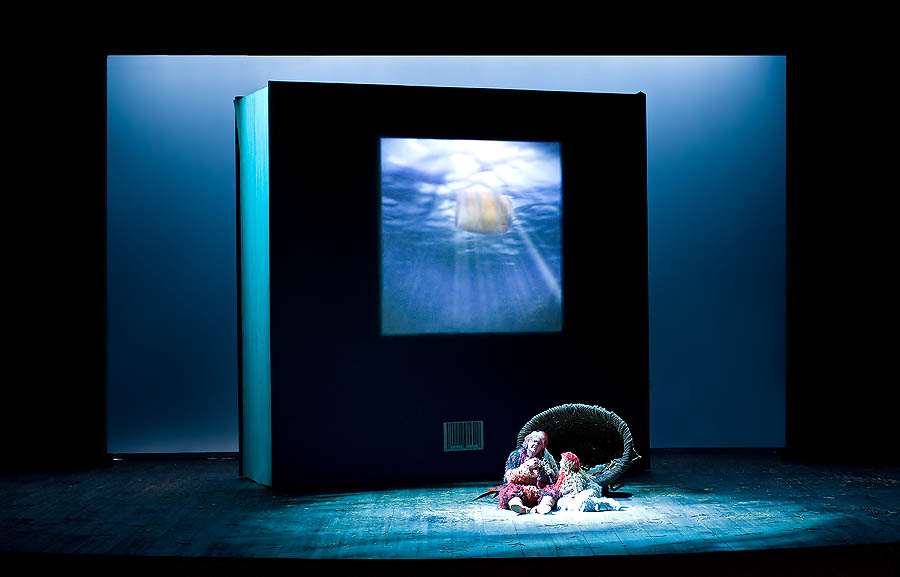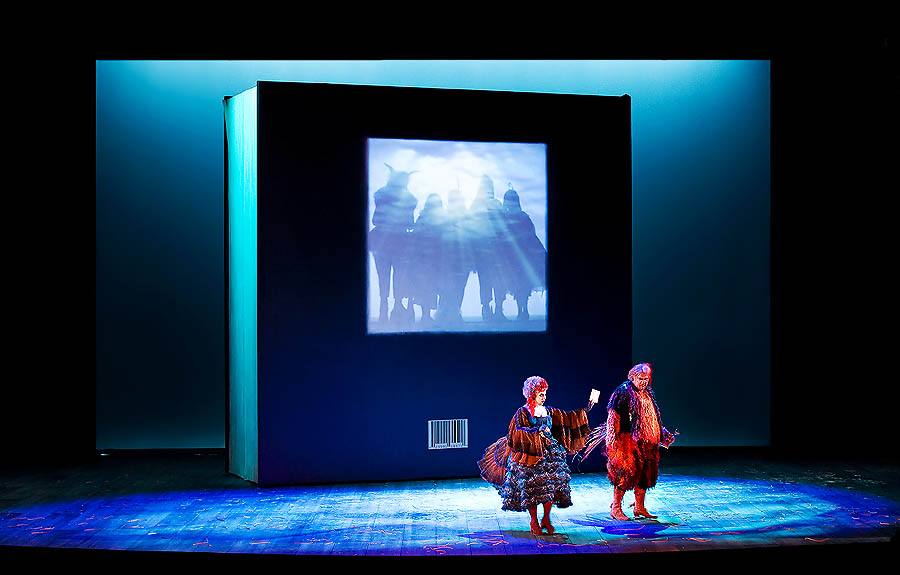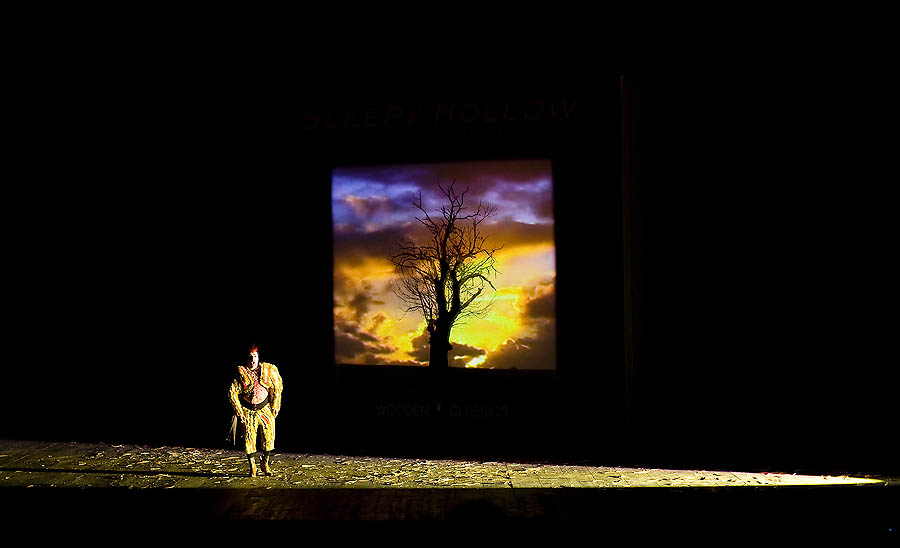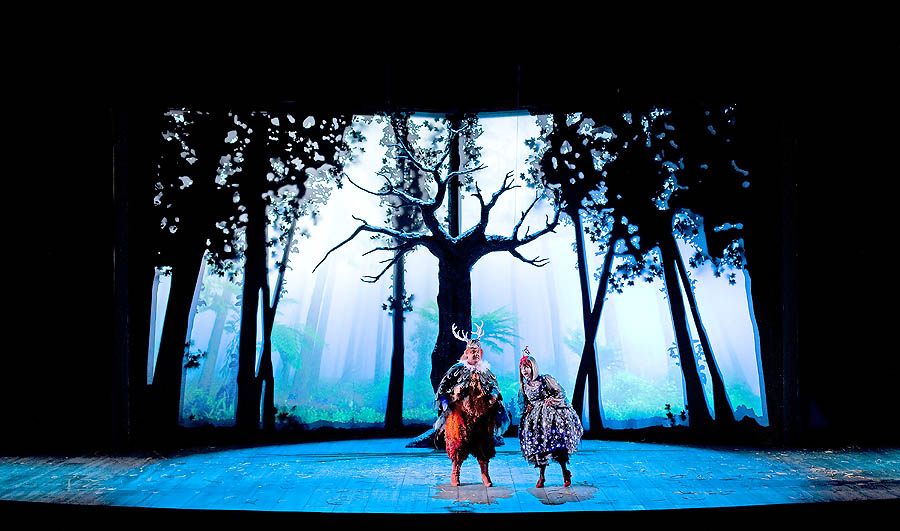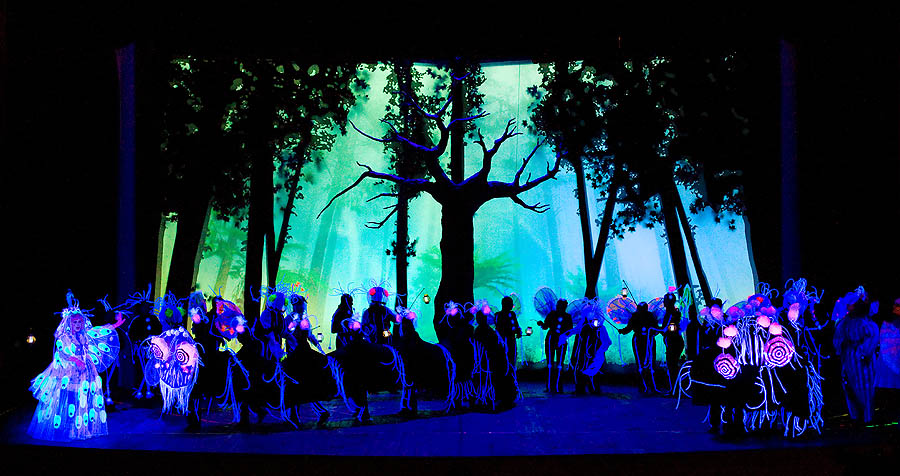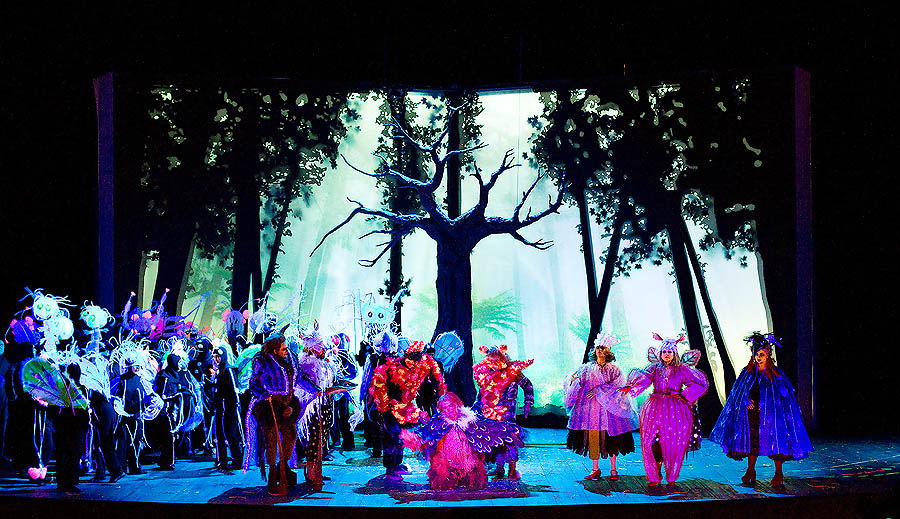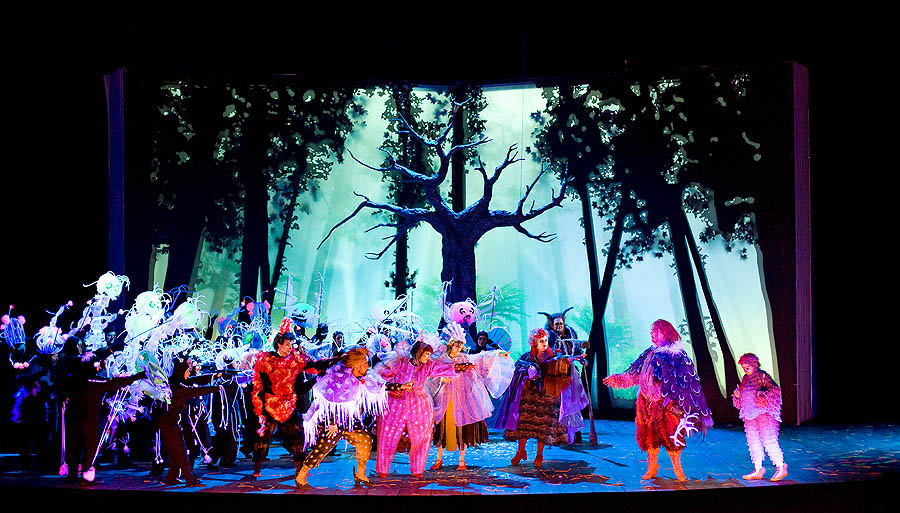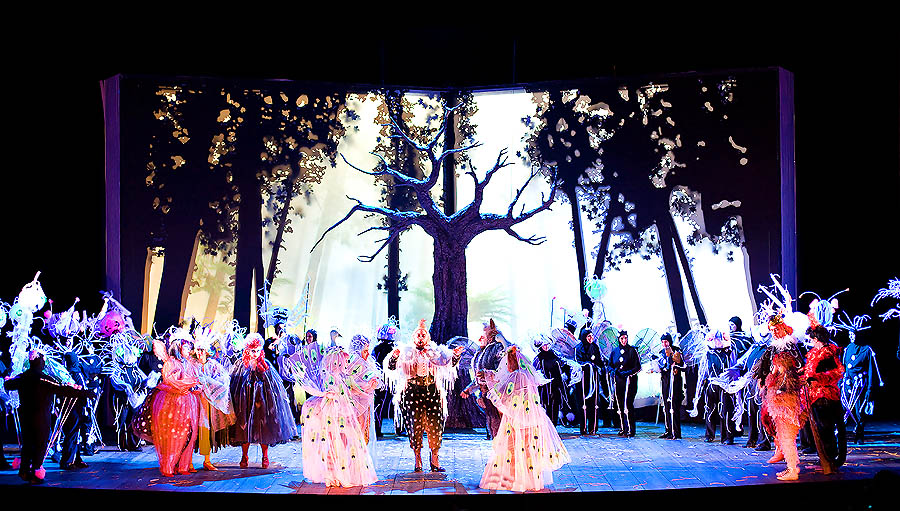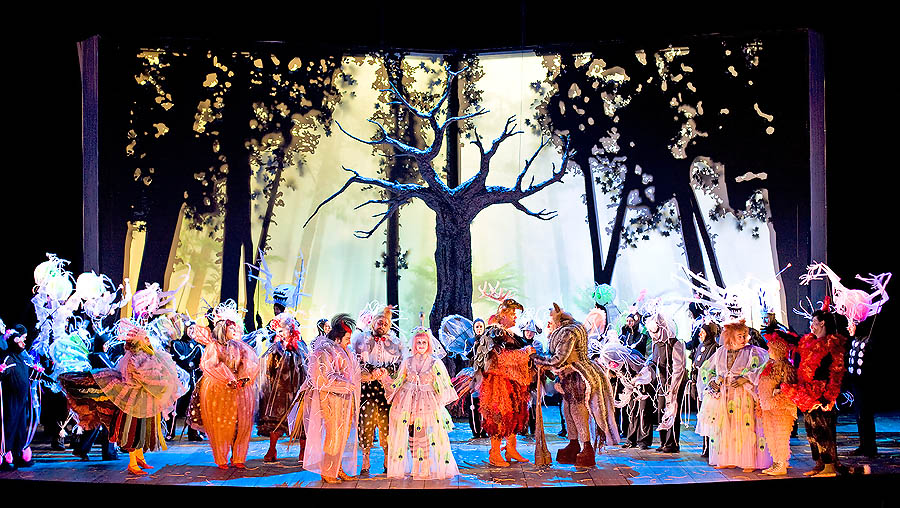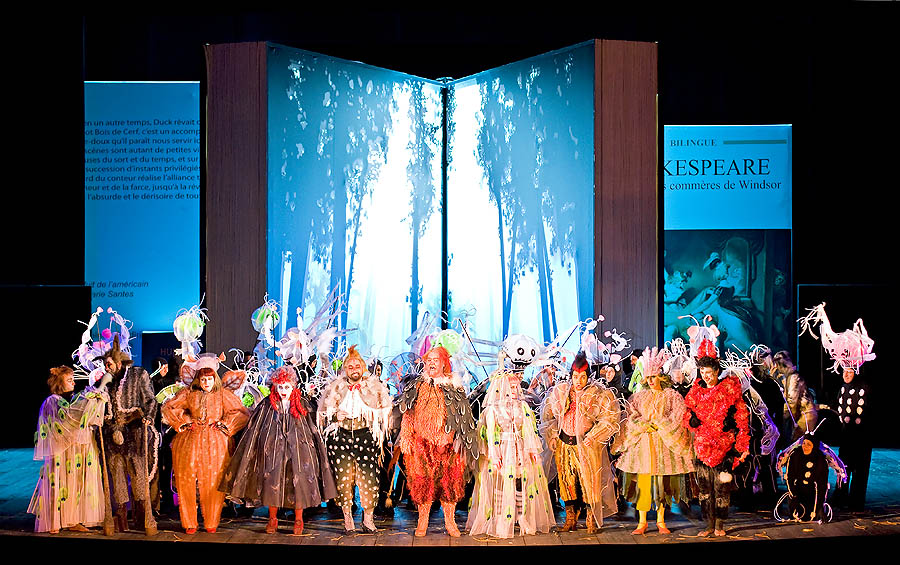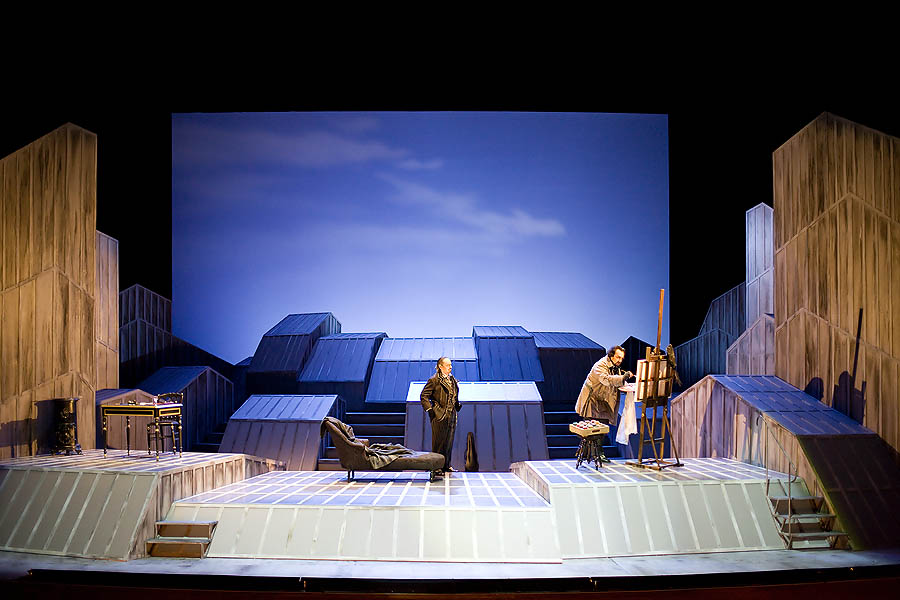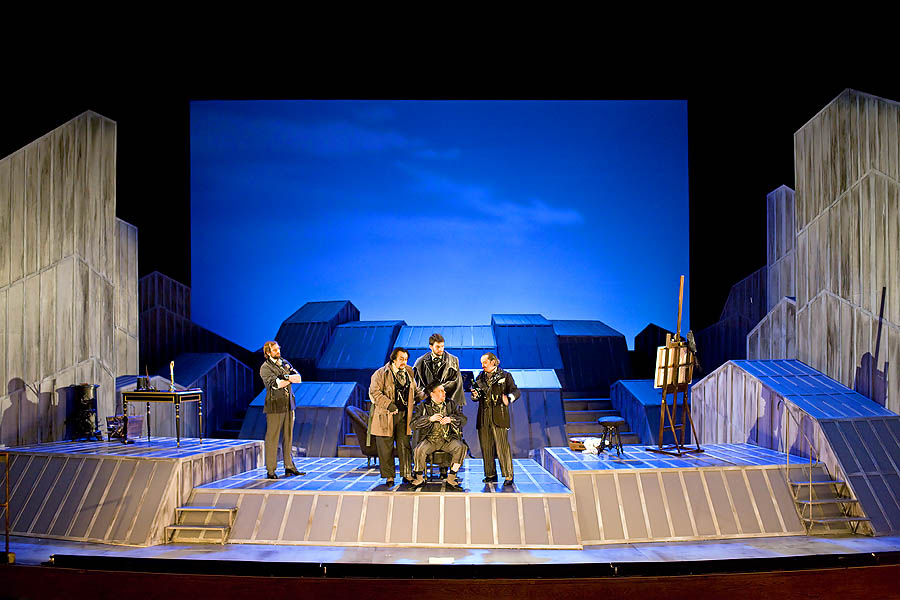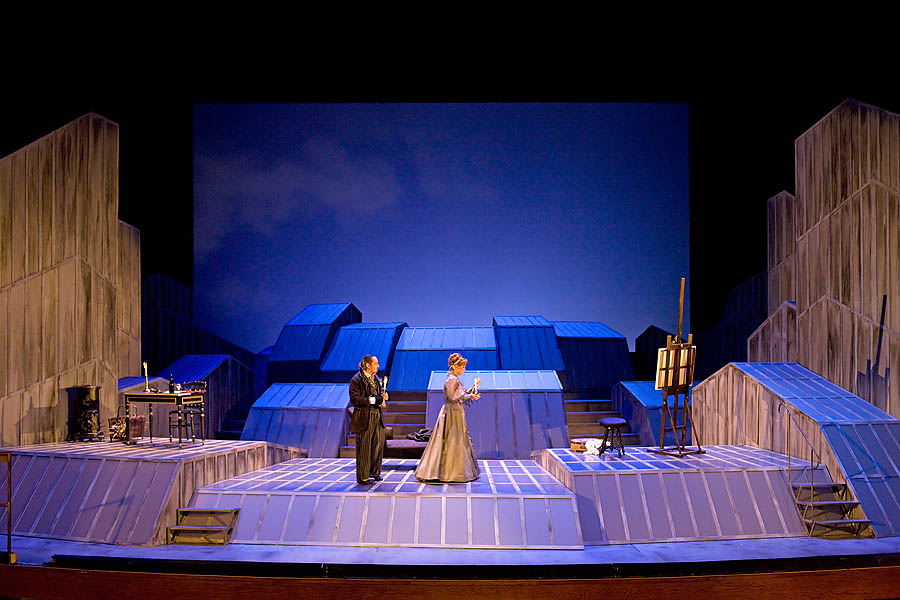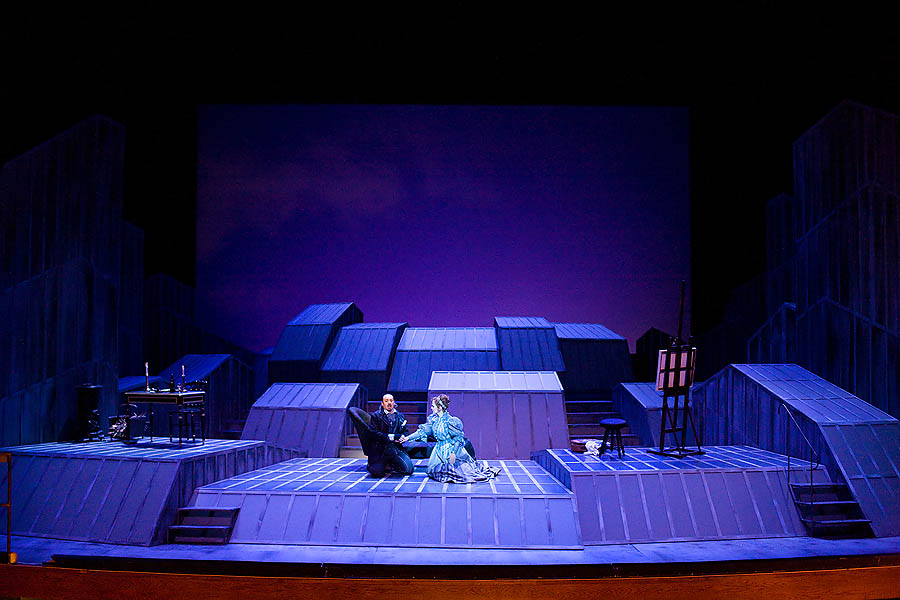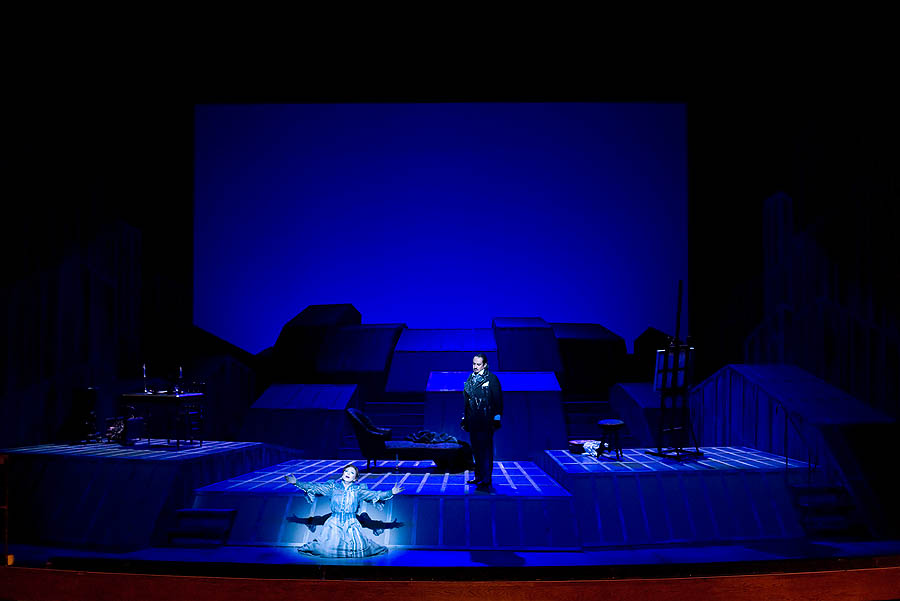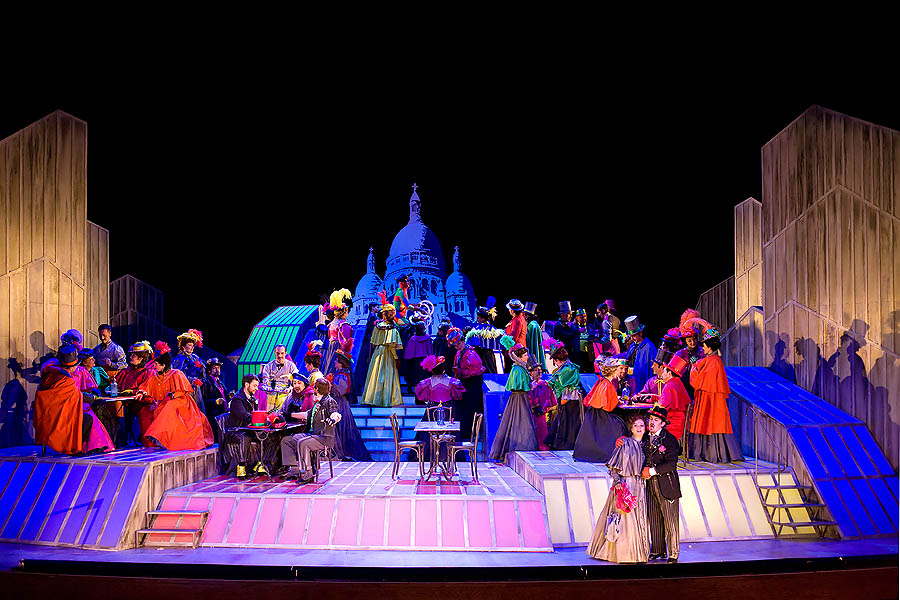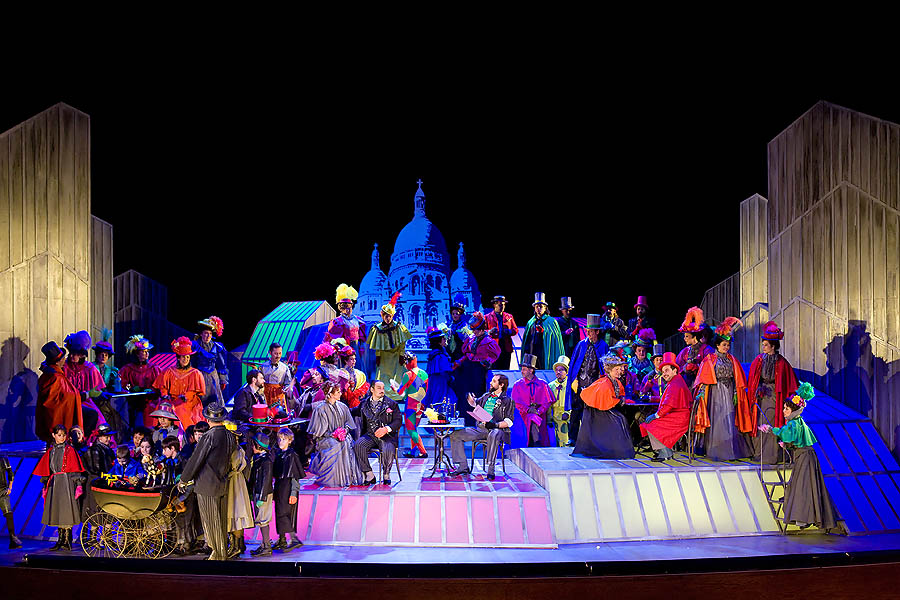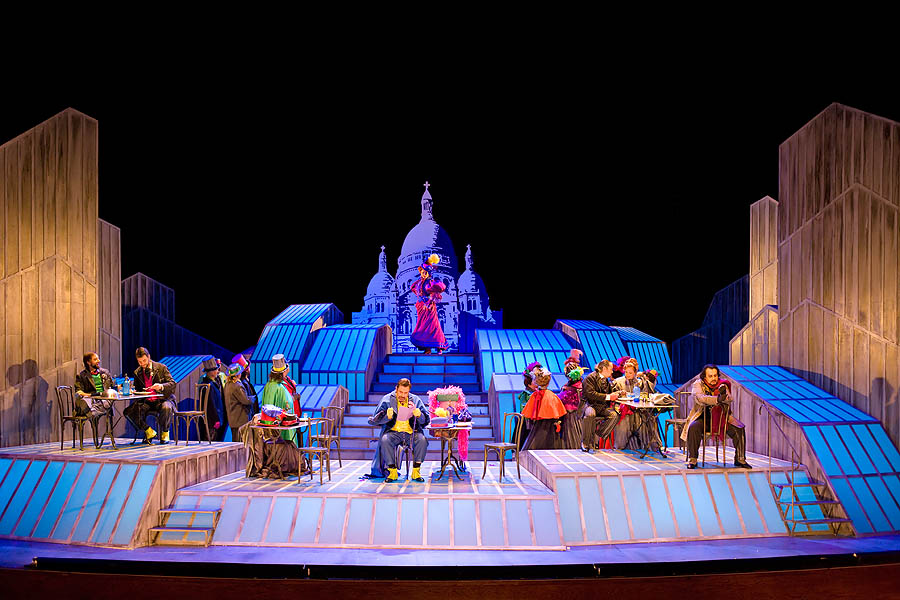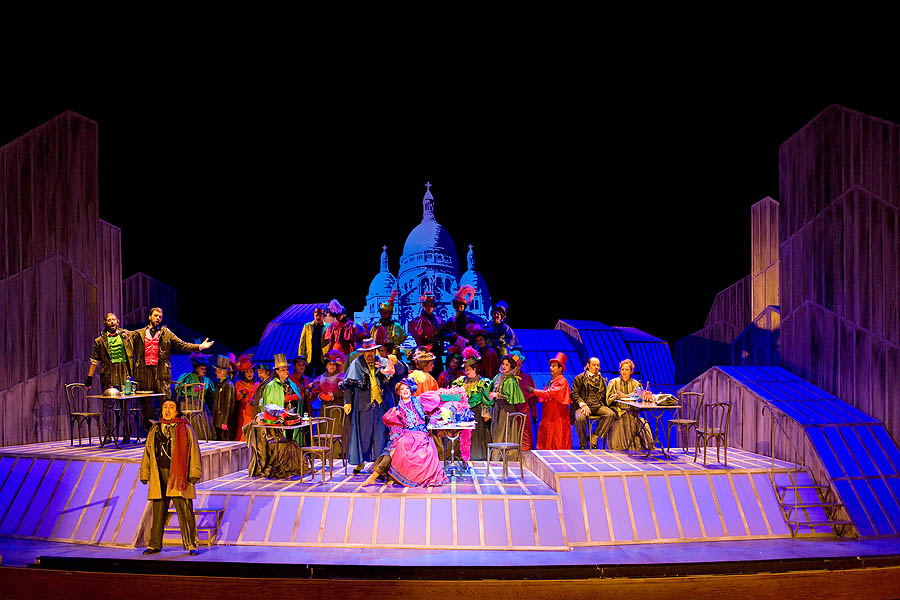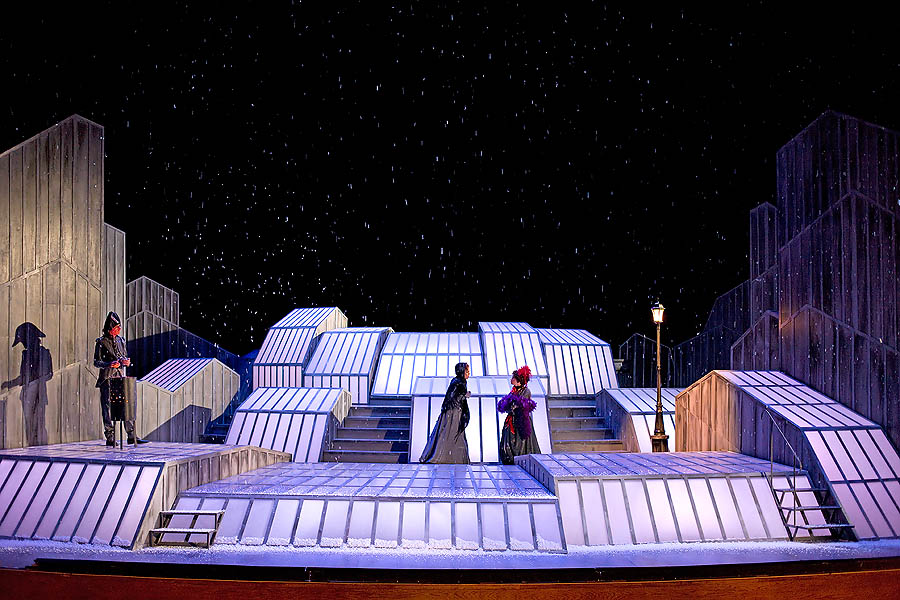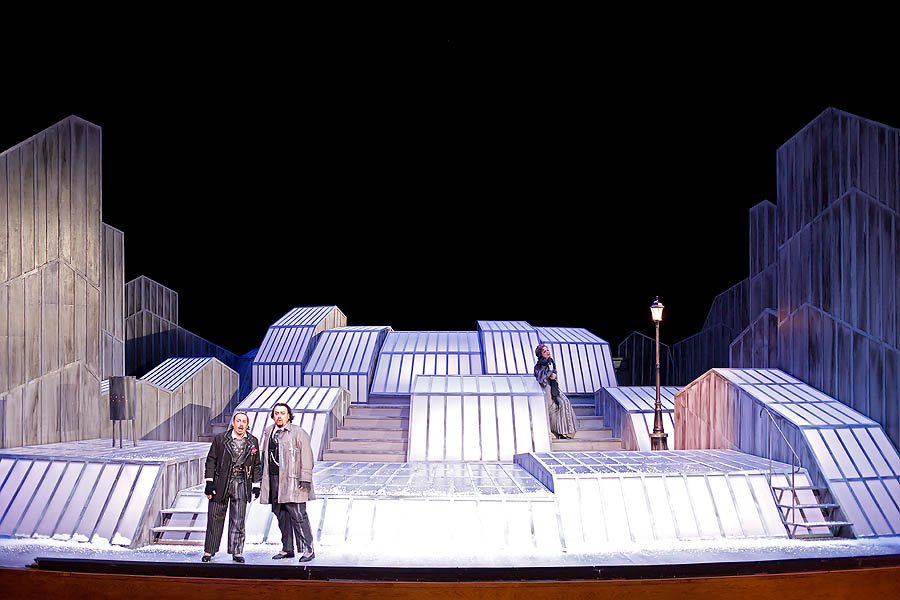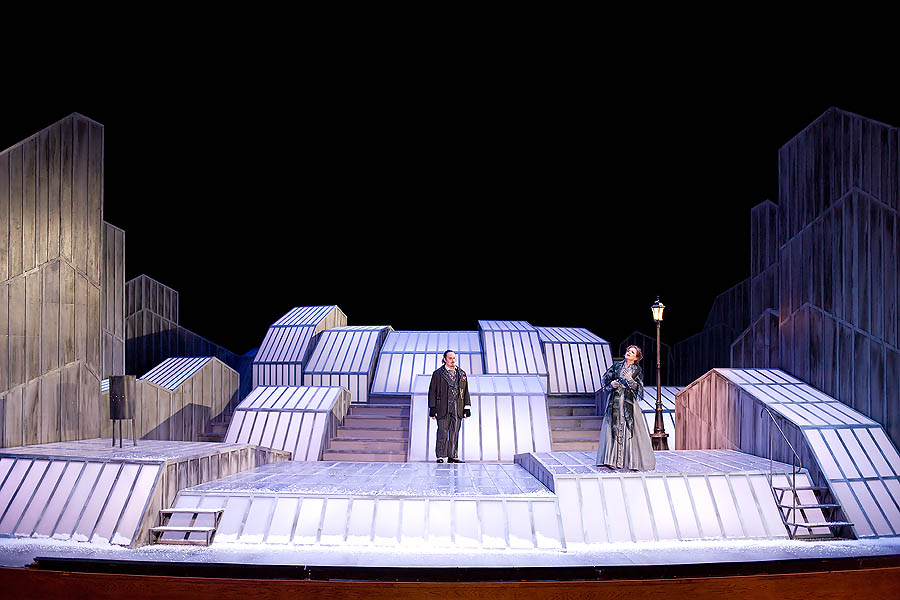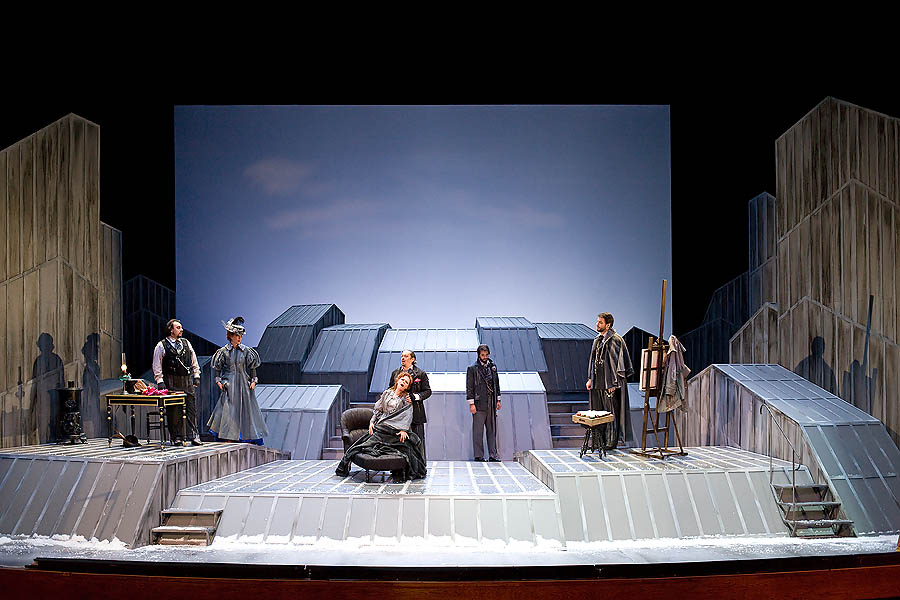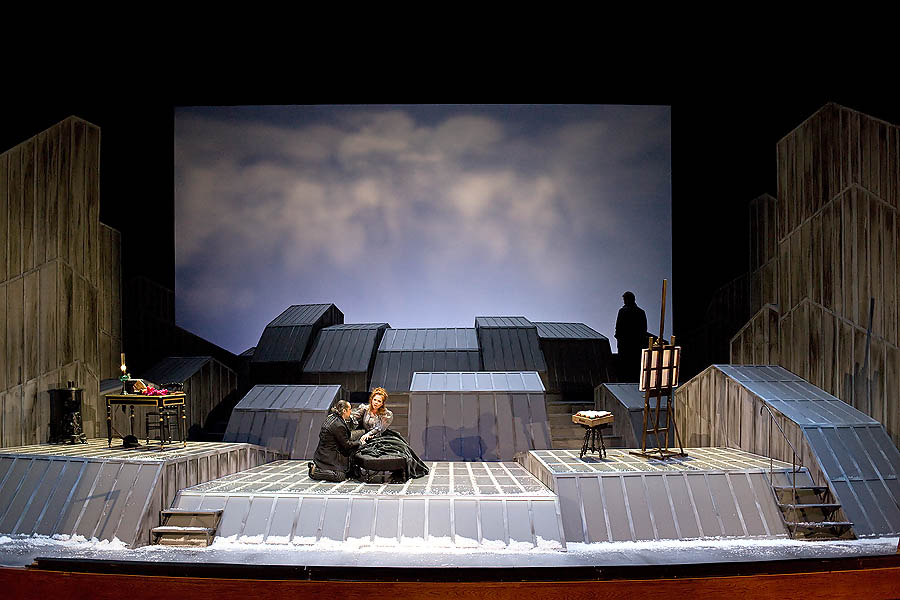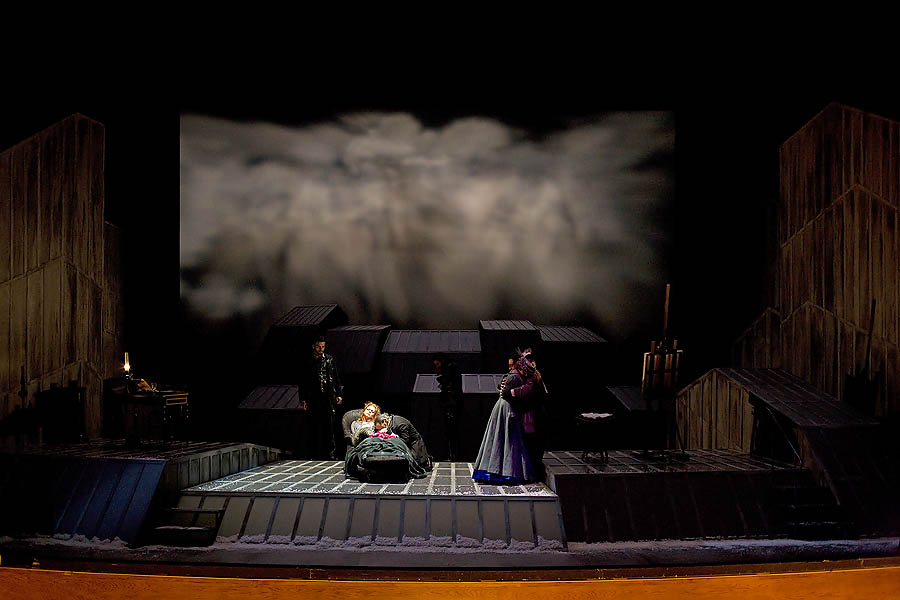Panoramic views and giant photos visible on three grades of enlargement
© Dr Giuseppe Mazza
The reproduction even partial of the photos without the author’s written permission is forbidden
Princes entrance to the Opera of Monte Carlo
Salle Garnier ceiling at the Opera of Monte Carlo
Fresco “The Music”, by Boulanger, in Salle Garnier, over the stage of the Opera of Monte Carlo.
Fresco “The Comedy”, by Lix, on a wall of Salle Garnier in the Opera of Monte Carlo.
Monte Carlo Opéra: representation of “Falstaff”, with music by Giuseppe Verdi. The libretto, by Arrigo Boito, is drawn from “The merry Wives of Windsor” by Shakespeare and, partly, from “Henry IV” – Orchestra conducted by Gianluigi Gelmetti – Productor: Jean-Louis Grinda – Scenarist: Rudy Sabounghi – Monte Carlo Philarmonic Orchestra.
Sir John Falstaff lives by his own wits at the Garter Inn. Once a famous Don Juan, he does not hesitate in seducing the rich ladies of Windsor for filling up his belly, and, with bad grace, orders his servants, Bardolph and Pistol to carry two love letters, identical but the addressee’s name, to Meg Page (Annunziata Vestri) and Alice Ford (Aga Mikolaj), on the right of the stage, who are friends and do the washing with Quickly (Mariana Pentcheva) and Nanette (Valérie Condoluci), daughter of the Ford’s. These last two, amused and annoyed at the same time, decide to give the scoundrel a lesson.
Monte Carlo Opéra: representation of “Falstaff”, with music by Giuseppe Verdi. The libretto, by Arrigo Boito, is drawn from “The merry Wives of Windsor” by Shakespeare and, partly, from “Henry IV” – Orchestra conducted by Gianluigi Gelmetti – Productor: Jean-Louis Grinda – Scenarist: Rudy Sabounghi – Monte Carlo Philarmonic Orchestra.
Also the men, from left, Dr. Cajus (Enrico Facini), Mr. Ford (Fabio Capitanucci), Bardolph (Rodolphe Briant) and Pistol (Wojtek Smilak), decide to avenge themselves upon him. The first had been robbed by Falstaff, and the second has just learnt by the last two, badly dismissed, that their master has written an ardent letter to his lady. On the background, the merry wives continue washing while on the right, Fenton (Florian Laconi), Nannetta’s sweetheart, enters the stage.
Monte Carlo Opéra: representation of “Falstaff”, with music by Giuseppe Verdi. The libretto, by Arrigo Boito, is drawn from “The merry Wives of Windsor” by Shakespeare and, partly, from “Henry IV” – Orchestra conducted by Gianluigi Gelmetti – Productor: Jean-Louis Grinda – Scenarist: Rudy Sabounghi – Monte Carlo Philarmonic Orchestra.
At Garter Inn, Sir John Falstaff (Bryn Terfel) sees, at first, Quickly, who gives him a message from Alice, that she waits for him, at home, from two to three o’clock, when her husband is out. It is a trap laid by the merry wives for jeering him. Then, Mr. Ford (Fabio Capitanucci), comes in, introducing himself under the false name of Master Brook, for acting the men’s revenge.
He tells him that he is fond of Alice, but that he is unable to seduce her, as she is a pattern of faithfulness. If, in exchange of a purse of silver as a bait, Falstaff will be able to scratch her virtue, then he will find the way smoothed.
Falstaff accepts his proposal with a handshake, and while going to dress for the love meeting, he tells the benefactor that he has already received an invitation about it by Mrs. Ford, between two and three o’clock, when her husband is not there. It is unnecessary to say that Mr. Ford, unaware of the plot made by the ladies, is at first prey of despair and then of anger. They part cheerfully, but he is impatient to discover at home the adultery and cut the throat of the culprit.
Monte Carlo Opéra: representation of “Falstaff”, with music by Giuseppe Verdi. The libretto, by Arrigo Boito, is drawn from “The merry Wives of Windsor” by Shakespeare and, partly, from “Henry IV” – Orchestra conducted by Gianluigi Gelmetti – Productor: Jean-Louis Grinda – Scenarist: Rudy Sabounghi – Monte Carlo Philarmonic Orchestra.
At the Ford’s in the mean time, the wives receive Quickly (Mariana Pentcheva) on the left, who tells them to get ready as Falstaff has been trapped. At the centre, Nannetta (Valérie Conoluci), is crying because her father wants her to marry Dr. Cajus, but she is in love with Fenton. The mother, Alice Ford (Aga Mikolaj), on the right, promises her support.
Monte Carlo Opéra: representation of “Falstaff”, with music by Giuseppe Verdi. The libretto, by Arrigo Boito, is drawn from “The merry Wives of Windsor” by Shakespeare and, partly, from “Henry IV” – Orchestra conducted by Gianluigi Gelmetti – Productor: Jean-Louis Grinda – Scenarist: Rudy Sabounghi – Monte Carlo Philarmonic Orchestra.
Alice Ford (Aga Mikolaj) awaits, at the centre of the stage, Sir John Falstaff (Bryn Terfel) who is coming out, triumphant, from the story book. But his courting is short-lasting, as the wives come, frightened, with the news that Mr. Ford is arriving with a punitive team composed by Dr. Cajus, Bardolph, Pistol, Fenton and other neighbours.
Monte Carlo Opéra: representation of “Falstaff”, with music by Giuseppe Verdi. The libretto, by Arrigo Boito, is drawn from “The merry Wives of Windsor” by Shakespeare and, partly, from “Henry IV” – Orchestra conducted by Gianluigi Gelmetti – Productor: Jean-Louis Grinda – Scenarist: Rudy Sabounghi – Monte Carlo Philarmonic Orchestra.
Falstaff (Bryn Terfel) hides behind a screen, while Mr. Ford (Fabio Capitanuccio) looks for him, furious, into the big basket of the dirty linen. After having, unsuccessfully, turned all the wash upside down, he runs to look for him in the other rooms, while Meg, pretending surprised to see him, hides Falstaff into the basket, which has been already searched, under the stinking linen.
Monte Carlo Opéra: representation of “Falstaff”, with music by Giuseppe Verdi. The libretto, by Arrigo Boito, is drawn from “The merry Wives of Windsor” by Shakespeare and, partly, from “Henry IV” – Orchestra conducted by Gianluigi Gelmetti – Productor: Jean-Louis Grinda – Scenarist: Rudy Sabounghi – Monte Carlo Philarmonic Orchestra.
Mr. Ford comes back on the stage with the team. They have searched all the house, and he is not there. He can hide, then, only behind the screen. Dr. Cajus opens it, and much to his and the furious father’s surprise, they discover Nannetta (Valérie Condoluci) and Fenton (Florian Laconi), embraced. Profiting by the mess, they had, in fact, withdrawn for kissing. Fenton runs away and the linen basket is thrown into the Thames.
Monte Carlo Opéra: representation of “Falstaff”, with music by Giuseppe Verdi. The libretto, by Arrigo Boito, is drawn from “The merry Wives of Windsor” by Shakespeare and, partly, from “Henry IV” – Orchestra conducted by Gianluigi Gelmetti – Productor: Jean-Louis Grinda – Scenarist: Rudy Sabounghi – Monte Carlo Philarmonic Orchestra.
Sir John Falstaff (Bryn Terfel), half-drowned and filthy, still thinks to the scorching misfortune and recovers, drinking, at the inn.
Monte Carlo Opéra: representation of “Falstaff”, with music by Giuseppe Verdi. The libretto, by Arrigo Boito, is drawn from “The merry Wives of Windsor” by Shakespeare and, partly, from “Henry IV” – Orchestra conducted by Gianluigi Gelmetti – Productor: Jean-Louis Grinda – Scenarist: Rudy Sabounghi – Monte Carlo Philarmonic Orchestra.
Quickly (Mariana Pentcheva) enters again the stage. In accordance with the wives, she wants to make things worse. She gives him another card from Alice, she wants him to be by midnight in Windsor forest, close to the old oak, disguised as “Black Huntsman”, with a headgear with long horns on top. Falstaff (Bryn Terfel) is caught again in the trap.
Monte Carlo Opéra: representation of “Falstaff”, with music by Giuseppe Verdi. The libretto, by Arrigo Boito, is drawn from “The merry Wives of Windsor” by Shakespeare and, partly, from “Henry IV” – Orchestra conducted by Gianluigi Gelmetti – Productor: Jean-Louis Grinda – Scenarist: Rudy Sabounghi – Monte Carlo Philarmonic Orchestra.
All are aware, of course. Inspired by a tale, Nannetta will disguise as “Queen of the Fairies”, and the inhabitants of Windsor will dress as sylphs, elves, goblins, devils and vampires. Mr. Ford promises Dr. Cajus that he will profit of the situation for giving him Nannetta, explains him how to disguise, and he will, himself, consecrate their union. But Quickly listens to the conversation and informs her friends. Fenton (Florian Laoni) is the first to get at the great oak by the sunset and Nannetta replies to him, but Alice interrupts them, explaining them how they are to disguise for upsetting her husband’s plans.
Monte Carlo Opéra: representation of “Falstaff”, with music by Giuseppe Verdi. The libretto, by Arrigo Boito, is drawn from “The merry Wives of Windsor” by Shakespeare and, partly, from “Henry IV” – Orchestra conducted by Gianluigi Gelmetti – Productor: Jean-Louis Grinda – Scenarist: Rudy Sabounghi – Monte Carlo Philarmonic Orchestra.
With his great horns on the head and an eagle beak, Falstaff (Bryn Terfel) meets Alice (Aga Mikolaj), but a yell is heard and the spirits come out in the dark of the night.
Monte Carlo Opéra: representation of “Falstaff”, with music by Giuseppe Verdi. The libretto, by Arrigo Boito, is drawn from “The merry Wives of Windsor” by Shakespeare and, partly, from “Henry IV” – Orchestra conducted by Gianluigi Gelmetti – Productor: Jean-Louis Grinda – Scenarist: Rudy Sabounghi – Monte Carlo Philarmonic Orchestra.
Nannetta (Valérie Condoluci) surrounded by the figurants tunes the song of the Queen of the Fairies. Falstaff, terrified, hides his face on the ground not to see the spirits. And all take advantage of this for stinging him and whipping him with osiers and nettles.
Monte Carlo Opéra: representation of “Falstaff”, with music by Giuseppe Verdi. The libretto, by Arrigo Boito, is drawn from “The merry Wives of Windsor” by Shakespeare and, partly, from “Henry IV” – Orchestra conducted by Gianluigi Gelmetti – Productor: Jean-Louis Grinda – Scenarist: Rudy Sabounghi – Monte Carlo Philarmonic Orchestra.
Falstaff (Bryn Terfel) repents and begs pardon.
Monte Carlo Opéra: representation of “Falstaff”, with music by Giuseppe Verdi. The libretto, by Arrigo Boito, is drawn from “The merry Wives of Windsor” by Shakespeare and, partly, from “Henry IV” – Orchestra conducted by Gianluigi Gelmetti – Productor: Jean-Louis Grinda – Scenarist: Rudy Sabounghi – Monte Carlo Philarmonic Orchestra.
One of his torturers loses his hood, and recognizing the servant Bardolph (Rodolphe Briant), Falstaff (Bryn Terfel), discovers the mise en scène. All accuse him and he accepts the punishment and admits his wrongs. Mr. Ford (Fabio Capitanucci) discloses Falstaff his real identity and shouts him “tell me now who is the cuckold”.
Monte Carlo Opéra: representation of “Falstaff”, with music by Giuseppe Verdi. The libretto, by Arrigo Boito, is drawn from “The merry Wives of Windsor” by Shakespeare and, partly, from “Henry IV” – Orchestra conducted by Gianluigi Gelmetti – Productor: Jean-Louis Grinda – Scenarist: Rudy Sabounghi – Monte Carlo Philarmonic Orchestra.
The wives disguise Bardolph (Rodolphe Briant) as a bride, place him, in lieu of Nannetta, close to Dr. Cajus (Enrico Facini), and inform Mr. Ford (Fabio Capitanucci) that there is another couple to marry. Actually, it’s Nannetta (Valérie Condoluci), hidden by the dress and the veil, and of her Fenton (Florian Laconi). In the darkness of the night, Mr. Ford does not realize the swop, and marries them.
Monte Carlo Opéra: representation of “Falstaff”, with music by Giuseppe Verdi. The libretto, by Arrigo Boito, is drawn from “The merry Wives of Windsor” by Shakespeare and, partly, from “Henry IV” – Orchestra conducted by Gianluigi Gelmetti – Productor: Jean-Louis Grinda – Scenarist: Rudy Sabounghi – Monte Carlo Philarmonic Orchestra.
All take off their masks, but it is too late, he has married his daughter with Fenton. In the end, all reconcile and also the father blesses their union, but Falstaff does not give up to return; “Dear Mr. Ford, tell me, who is the dupe now?”
Monte Carlo Opéra: representation of “Falstaff”, with music by Giuseppe Verdi. The libretto, by Arrigo Boito, is drawn from “The merry Wives of Windsor” by Shakespeare and, partly, from “Henry IV” – Orchestra conducted by Gianluigi Gelmetti – Productor: Jean-Louis Grinda – Scenarist: Rudy Sabounghi – Monte Carlo Philarmonic Orchestra.
The book of the story closes and Falstaff (Bryn Terfel) concludes: “All in the world is a jest”.
The Monte Carlo Opéra: The Bohème by Giacomo Puccini. Conductor: Antonio Fogliani – Productor: Jean-Louis Pichon – Stage manager: Alexandre Heyraud – Monte Carlo Philharmonic Orchestra.
It’s Christmas eve. Marcello (George Petan), painter, and Rodolfo (Stefano Secco), poet, are trying to warm up in a poor garret.
The Monte Carlo Opéra: The Bohème by Giacomo Puccini. Conductor: Antonio Fogliani – Productor: Jean-Louis Pichon – Stage manager: Alexandre Heyraud – Monte Carlo Philharmonic Orchestra.
Colline (Gabor Bretz), a friend philosopher, on the left, and Schaunard (Etienne Dupuis), musician, at the centre, with a basket full of food, happy for having gotten some money. The feast is short-lasting, as Benoît (Guy Bonfiglio), the owner, sitting at the centre, gets in claiming for the payment of the rental. The friends oblige him to drink, and, once drunk, he confesses of having betrayed his wife. This is a good pretext the tenants were looking for, and, with indignation, show him the door .
The Monte Carlo Opéra: The Bohème by Giacomo Puccini. Conductor: Antonio Fogliani – Productor: Jean-Louis Pichon – Stage manager: Alexandre Heyraud – Monte Carlo Philharmonic Orchestra.
The friends go out bound to the Café Momus, but Rodolfo (Stefano Secco) remains at home as he has to complete an article. Alone, he hears somebody knocking at the door. It is the neighbour, Mimi’ (Inva Mula), looking for a candle to light up the lamp which is out. Then, the girl does not feel well, this is the first symptom of the TB which will carry her to the grave .
The Monte Carlo Opéra: The Bohème by Giacomo Puccini. Conductor: Antonio Fogliani – Productor: Jean-Louis Pichon – Stage manager: Alexandre Heyraud – Monte Carlo Philharmonic Orchestra.
Raising herself for going back home, she realizes of having lost the key which they look for, in the darkness, on the ground, as a gust of wind has extinguished both lights. Rodolfo (Stefano Secco), finds the key and hides it in his pocket. When his hand meets the one of Mimi’ (Inva Mula), the poet discloses his love singing “Che gelida manina” (What a chilly small hand), and asks her to tell him about herself .
The Monte Carlo Opéra: The Bohème by Giacomo Puccini. Conductor: Antonio Fogliani – Productor: Jean-Louis Pichon – Stage manager: Alexandre Heyraud – Monte Carlo Philharmonic Orchestra.
Mimi’ (Inva Mula) tells him she is an embroider. She lives by herself, creating imitation flowers. The act ends with a love duet “O soave fanciulla” (Oh, sweet girl) .
The Monte Carlo Opéra: The Bohème by Giacomo Puccini. Conductor: Antonio Fogliani – Productor: Jean-Louis Pichon – Stage manager: Alexandre Heyraud – Monte Carlo Philharmonic Orchestra.
The two of them join the friends at Café Mimus. Mimi’ (Inva Mula) has found the love and is full of happiness. Rodolfo (Stefano Secco) has just given her, as a present, a red hat .
The Monte Carlo Opéra: The Bohème by Giacomo Puccini. Conductor: Antonio Fogliani – Productor: Jean-Louis Pichon – Stage manager: Alexandre Heyraud – Monte Carlo Philharmonic Orchestra.
Important meeting place of the city, the Café Mimus is very much popular. Rodolfo (Stefano Secco) introduces Mimi’ (Inva Mula) to his friends .
The Monte Carlo Opéra: The Bohème by Giacomo Puccini. Conductor: Antonio Fogliani – Productor: Jean-Louis Pichon – Stage manager: Alexandre Heyraud – Monte Carlo Philharmonic Orchestra.
Then comes the fascinating Musetta (Karen Vourc’h), on the upper part of the stage. She is the mistress of the rich state councillor, Alcidoro (Jean-François Vinciguerra), sitting at the centre .
The Monte Carlo Opéra: The Bohème by Giacomo Puccini. Conductor: Antonio Fogliani – Productor: Jean-Louis Pichon – Stage manager: Alexandre Heyraud – Monte Carlo Philharmonic Orchestra.
Old flame of the painter Marcello (George Petan), Musetta (Karen Vourc’h) does her best to draw his attention. She intones a provoking song “Quando me’n vo” (When I go) and asks him to take her off, with an excuse, a bootee, showing, scandalously, her ankle. The two old lovers run away together, leaving Alcindoro (Jean-François Vinciguerra) alone and to pay the bill .
The Monte Carlo Opéra: The Bohème by Giacomo Puccini. Conductor: Antonio Fogliani – Productor: Jean-Louis Pichon – Stage manager: Alexandre Heyraud – Monte Carlo Philharmonic Orchestra.
It snows a lot at the Barriera d’Enfer, where Mimi’ (Inva Mula), now seriously ill, looks for Marcello, who works in a public house, to tell him that Rodolfo has abandoned her. “O buon Marcello, aiuto!” (Oh, good Marcello, help!) .
The Monte Carlo Opéra: The Bohème by Giacomo Puccini. Conductor: Antonio Fogliani – Productor: Jean-Louis Pichon – Stage manager: Alexandre Heyraud – Monte Carlo Philharmonic Orchestra.
Marcello (George Petan) explains her that Rodolfo (Stefano Secco) is in the public house, sleeping. Then, this one wakes up and gets out looking for his friend. Mimi’ (Inva Mula) hides and listens to his conversation with Marcello. She learns that he has left her just to allow her to find another man, wealthier, who can better lodge her and save from tubercolosis .
The Monte Carlo Opéra: The Bohème by Giacomo Puccini. Conductor: Antonio Fogliani – Productor: Jean-Louis Pichon – Stage manager: Alexandre Heyraud – Monte Carlo Philharmonic Orchestra.
Mimi’ (Inva Mula) reappears on the stage and meets Rodolfo (Stefano Secco). They would wish to separate friendly “Donde lieta usci’” (From where she came happily out), but the memory of the nice hours spent together, compel them to postpone the separation till the next spring, the flowers season. In the mean time, Marcello and Musetta part after a violent quarrel .
The Monte Carlo Opéra: The Bohème by Giacomo Puccini. Conductor: Antonio Fogliani – Productor: Jean-Louis Pichon – Stage manager: Alexandre Heyraud – Monte Carlo Philharmonic Orchestra.
The protagonists, from left, Marcello (George Petan), Musetta (Karen Vourc’h), Rodolfo (Stefano Secco), Colline (Gabor Bretz) and Schaunard (Etienne Dupuis) meet in the garret with Mimi’ (Inva Mula). This one has just left a rich protector and has been picked up, on the street, wandering and weak, by Musetta .
The Monte Carlo Opéra: The Bohème by Giacomo Puccini. Conductor: Antonio Fogliani – Productor: Jean-Louis Pichon – Stage manager: Alexandre Heyraud – Monte Carlo Philharmonic Orchestra.
Understanding that the end is approaching, the friends leave alone Mimi’ (Inva Mula) and Rodolfo (Stefano Secco) who recall in the duet “Sono andati?” (Did they go?), their first encounter and the happy moments. And the red hat Rodolfo has kept as a memory after their separation, gives a moment of joy to Mimi’ .
The Monte Carlo Opéra: The Bohème by Giacomo Puccini. Conductor: Antonio Fogliani – Productor: Jean-Louis Pichon – Stage manager: Alexandre Heyraud – Monte Carlo Philharmonic Orchestra.
Mimi’ (Inva Mula) passes away quietly, as if sleeping, surrounded by the friends, who had renounced to a pair of ear-rings and to a cloak for buying some medicines and for calling a physician .

